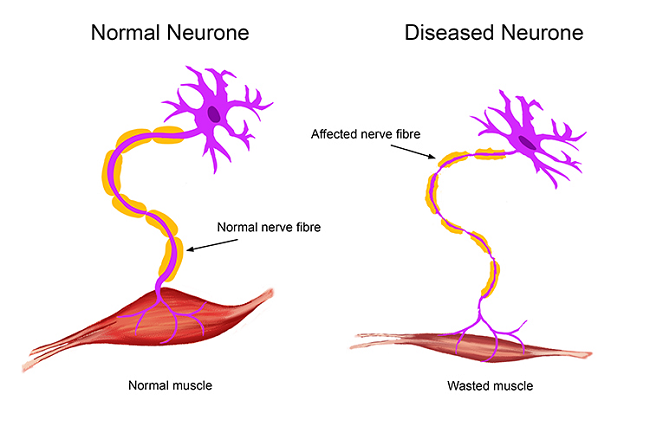Motor Neuron Disease (MND) is a rare disease that progressively affects the nervous system (brain and nerves). It is a neurodegenerative disorder mainly responsible for the degeneration of neurons in the brain.

Types of Motor Neurone Disease (MND)
Motor Neurone Disease is classified into five types depending upon the damaged motor neurons:
- Amyotrophic Lateral Sclerosis (ALS)
- Primary Lateral Sclerosis (PLS)
- Progressive Bulbar Palsy (PBP)
- Progressive Muscular Atrophy (PMA)
- Spinal Muscular Atrophy (SMA)
1. Amyotrophic Lateral Sclerosis (ALS)
It is the most common type that includes the damage of upper and lower neurons (in the spinal cord and brain). It affects the muscles of the mouth, arms, legs, and respiratory system.
2. Primary Lateral Sclerosis (PLS)
It is a rare form that includes the degeneration of brain neurons.
3. Progressive Bulbar Palsy (PBP)
It involves the damage of the brainstem causing difficulty in eating, speaking, and swallowing.
4. Progressive Muscular Atrophy (PMA)
It is a rare condition which includes the motor neurons present in the spinal cord
5. Spinal Muscular Atrophy (SMA)
It is known as the inherited form that strikes children and affects the arms, trunk, and legs.
Cause of Motor Neurone Disease (MND)
Though the exact cause of Motor Neurone Disease (MND) is not known, it is believed that environmental, viral, toxic, and genetic factors may be responsible for the Motor Neurone Disease. It may be the result of DNA damage. In adults, men are more prone to get affected by this disease.
Symptoms of Motor Neurone Disease (MND)
The symptoms of MND can be divided into three stages i.e initial, advanced and end-stage.
Symptoms at the Initial Stage
- Persistent fatigue
- Weak hand grip
- Mumbled speech
- Muscle Cramps
- Weakness in legs and arms
- Difficulties in swallowing food
- Lack of balance
- Breathlessness
- Unusual emotions
- Loss of weight
Symptoms at the Advanced Stage
- Difficulty in movement
- Muscle shrinkage
- Joint pain
- Difficulty in breathing
- Difficulty in swallowing
- Pain in jaws
- Changes in personality
Symptoms at End Stage
- Complete paralysis including all parts of the body
- The severity of respiratory/breathing problems
Nincsenek megjegyzések:
Megjegyzés küldése
Megjegyzés: Megjegyzéseket csak a blog tagjai írhatnak a blogba.